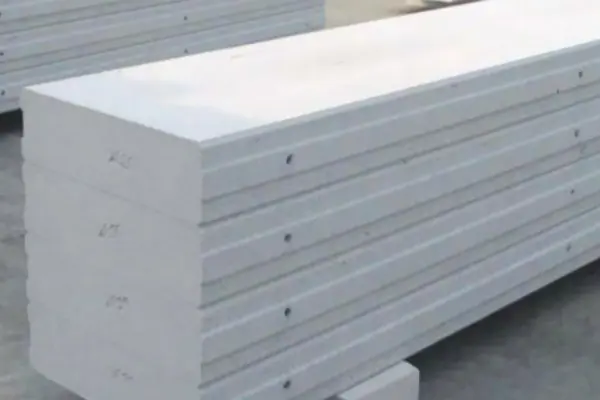Autoclaved Lightweight Concrete (ALC) panels are versatile building materials known for their strength, lightweight properties, and thermal insulation capabilities. These panels are widely used in construction for walls, floors, roofs, and facades in both residential and commercial buildings. The thickness of an ALC panel can vary depending on its intended use, structural requirements, and insulation needs, with different thicknesses offering distinct benefits. In this article, we’ll explore the typical thicknesses of ALC panels, their applications, and why they are so popular in modern construction.
What is an ALC Panel?
An ALC panel is a precast building material made from lightweight concrete, produced using autoclaving—a high-pressure steam curing process. This method gives the material its durability, lightweight, and thermal insulation properties. ALC panels are typically composed of cement, lime, quartz sand, and a small amount of aluminum powder, which reacts during the autoclaving process to form tiny air bubbles. These air pockets contribute to the material’s lightweight and insulating properties, making it an ideal choice for energy-efficient buildings.
ALC panels offer several advantages in construction, including:
- Lightweight but Durable: These panels are much lighter than traditional concrete, making them easier to handle and install.
- Thermal and Acoustic Insulation: ALC panels provide excellent insulation, helping to maintain stable indoor temperatures and reduce noise.
- Fire Resistance: The autoclaving process makes the material non-combustible, contributing to fire safety in buildings.
- Eco-Friendly: ALC panels are made from natural materials, and their energy-efficient properties help reduce heating and cooling costs.
Common Thicknesses of ALC Panels
The thickness of ALC panels can vary depending on their specific application in a building. Below are some of the typical thicknesses of ALC panels and the purposes they serve:
1. Internal Partition Walls: 75-100 mm
For internal partition walls, where load-bearing capacity isn’t as crucial, ALC panels are typically around 75-100 mm thick. This thickness provides sufficient structural support for interior walls while offering good soundproofing between rooms. These thinner ALC panels are ideal for dividing spaces in residential or commercial interiors, providing privacy and insulation without adding unnecessary weight to the building structure.
2. External Walls: 150-200 mm
For external walls, ALC panels are commonly around 150-200 mm thick. This extra thickness is necessary to support insulation against temperature fluctuations and to withstand exposure to outdoor elements. Thicker panels offer greater thermal insulation, helping to keep the building cooler in summer and warmer in winter. These ALC panels are also sturdy enough to support lightweight finishes, such as paint or stucco, and can withstand weather-related wear.
3. Floor Panels: 150-250 mm
In applications where ALC panels are used for flooring, a thickness of 150-250 mm is typically required. Floor panels need to withstand more significant loads and wear and tear compared to wall panels, so the added thickness enhances their load-bearing capacity and durability. Additionally, thicker ALC panels provide better acoustic insulation, reducing noise transmission between floors—a valuable feature for multi-story buildings or commercial spaces.
4. Roof Panels: 125-200 mm
For roofing, ALC panels are generally around 125-200 mm thick. Roof panels need to be both durable and lightweight to minimize the load on the building’s structure while providing sufficient thermal insulation. The chosen thickness depends on the climate and insulation requirements of the building, with thicker panels used in areas where temperature extremes are common.
Benefits of Choosing the Right Thickness
Choosing the appropriate thickness for an ALC panel is essential to ensure it meets the structural and insulation needs of the project. Here are some benefits associated with using the right thickness for different applications:
- Energy Efficiency: Thicker ALC panels in external walls and roofs improve a building’s thermal insulation, which helps reduce energy costs for heating and cooling. This efficiency contributes to a more comfortable indoor environment and lowers a building’s overall carbon footprint.
- Structural Integrity: Selecting the correct thickness for floors and roofs enhances the load-bearing capacity, reducing the likelihood of cracks, sagging, or other structural issues over time.
- Sound Insulation: Thicker ALC panels are effective in reducing sound transmission, and creating quieter spaces in multi-family residential or office buildings. This soundproofing can be particularly beneficial in high-traffic or noise-sensitive areas.
- Fire Safety: ALC panels are naturally fire-resistant due to the autoclaving process, but a thicker panel can offer additional fire protection, especially in exterior walls, roofs, and fire-rated walls between units.
Factors to Consider When Choosing Thickness
While general thickness guidelines exist, the ideal thickness of an ALC panel can depend on various factors, including the local building codes, climate conditions, and the specific performance requirements of the project. Some critical considerations include:
- Load Requirements: For floors and roofs, panels need to be thick enough to handle the weight of furniture, equipment, and people.
- Thermal Insulation Needs: In regions with extreme temperatures, thicker panels for walls and roofs help in maintaining energy efficiency and indoor comfort.
- Soundproofing: If noise reduction is a priority, thicker panels can provide better acoustic insulation, particularly for interior partition walls in shared buildings.
- Budget: While thicker ALC panels offer better insulation and strength, they can be more costly. Balancing the thickness with budget considerations and functional needs is important for cost-effective construction.
Conclusion: The Versatility of ALC Panels
The versatility of ALC panels in terms of thickness and application makes them an appealing option in modern construction. Whether for interior walls, external facades, floors, or roofs, ALC panels come in various thicknesses to meet the demands of different building components while providing thermal insulation, fire resistance, and structural stability. By selecting the right thickness, builders can ensure optimal performance, energy efficiency, and durability for their projects, making ALC panels a preferred choice in eco-friendly and energy-conscious construction.
Post time: 10 月-25-2024





